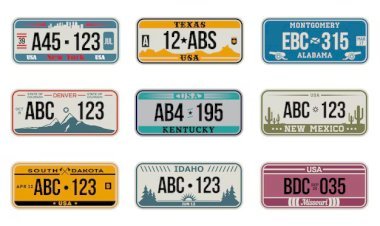13 Types of Keys in 2025: From Traditional Locks to Digital Security
Discover the top 13 types of keys used in 2025 for homes, cars, and businesses. From mechanical and dimple keys to biometric and cloud-based digital keys, explore their features, pros, and trends.

In today’s world, keys are more than simple tools to unlock doors; they are integral to security in homes, businesses, vehicles, and digital spaces. As technology advances, new types of keys have emerged, offering enhanced security, convenience, and even digital access solutions. This article delves into the many types of keys available in 2024, highlighting their unique functions, advantages, and latest technological advancements.
1. Traditional Mechanical Key

Traditional mechanical keys have been the standard for over a century. These keys operate through a series of grooves that align with a lock's pins, making them straightforward and durable.
- Common Uses: Home and office doors, padlocks, and basic security locks.
- Benefits: Affordable, easy to duplicate, durable, and requires no power source.
- Limitations: Limited security due to ease of duplication.
- Stats: In 2024, an estimated 70% of global households still use traditional mechanical keys for their primary security needs, mainly due to affordability.
2. Transponder Key

Transponder keys contain a microchip that communicates with the vehicle’s electronic system. Popular since the early 2000s, transponder keys have significantly reduced car theft rates.
- Common Uses: Primarily in automobiles, also found in some motorcycles.
- Benefits: Added security; only the programmed key can start the engine.
- Limitations: Expensive to replace if lost.
- Stats: In 2024, studies show that vehicles equipped with transponder keys have a 70% lower theft rate compared to those with standard keys, underscoring the security benefits.
3. Smart Key

Smart keys, often keyless, communicate with a vehicle or home system through radio-frequency identification (RFID) or Bluetooth technology. They are primarily used in high-end cars and smart homes.
- Common Uses: Modern vehicles, smart homes, and digital locks.
- Benefits: Allows hands-free entry and ignition, customizable through a mobile app.
- Limitations: Vulnerable to hacking, requires a battery.
- Trends: As of 2024, nearly 60% of new cars sold in the United States come equipped with smart key functionality. The global smart lock market, valued at $2 billion in 2023, is expected to grow by 25% in 2024 as more homes adopt smart home systems.
4. Skeleton Key

Skeleton keys are old-fashioned keys designed to open multiple locks with similar mechanisms, usually in older buildings and antique furniture.
- Common Uses: Antique furniture, historical buildings, and old doors.
- Benefits: Can open various locks in vintage settings.
- Limitations: Low-security level, outdated in most modern settings.
- Trivia: While largely obsolete, skeleton keys remain in demand for restoration projects and are considered collectibles, with some antique keys valued at over $100.
5. Dimple Key

Dimple keys use dimpled indentations instead of ridges, offering a more secure locking mechanism that is challenging to pick.
- Common Uses: High-security commercial buildings and safes.
- Benefits: Difficult to duplicate and provides better security.
- Limitations: More expensive than traditional keys.
- Stats: As of 2024, dimple keys are used by about 35% of businesses worldwide, particularly in financial institutions and high-security facilities, due to their enhanced protection.
6. Double-Sided Key

Double-sided keys have teeth on both sides of the blade, making them suitable for double-sided locks, which provide enhanced security.
- Common Uses: Some home doors and vehicle locks.
- Benefits: More secure than single-sided keys, harder to pick.
- Limitations: Requires compatible double-sided lock systems.
- Trend: The adoption of double-sided locks in residential properties is growing, with a 15% increase in installations since 2023, as homeowners seek improved security.
Read More: Best Boneshaker Bikes of 2024 – Top 6 Models to Ride
7. Tubular Key

Tubular keys, also known as barrel keys, are round and feature ridges on the edge. These are often used in vending machines, safes, and bike locks.
- Common Uses: Vending machines, safes, ATMs, and bike locks.
- Benefits: High security due to unique design, hard to duplicate.
- Limitations: Limited to specific lock types.
- Fun Fact: Tubular locks are among the hardest to pick, with only a 5% success rate among experienced locksmiths attempting unauthorized access.
8. Master Key

Image source: pinterest.com
A master key is designed to unlock multiple locks within a keying system. In a master key system, individual keys open specific doors, while the master key can open all doors within the system.
- Common Uses: Office buildings, hotels, and apartment complexes.
- Benefits: Allows easy access to multiple locks for authorized personnel, facilitating property management.
- Limitations: Security risk if the master key is lost or falls into the wrong hands.
- Stats: The demand for master key systems has surged in multi-tenant buildings and co-working spaces, with a projected 12% increase in installation requests in 2024, as companies focus on streamlined security solutions.
9. Key Cards

Key cards are plastic cards embedded with magnetic strips or RFID chips that grant access to buildings and rooms. They are common in hotels, corporate offices, and secure facilities.
- Common Uses: Hotels, offices, hospitals, and some residential complexes.
- Benefits: Easily programmable, can be deactivated if lost or stolen.
- Limitations: Can wear out over time and may need frequent replacements.
- Stats: The key card industry has grown alongside the hospitality sector, with 85% of hotels in developed countries using key card systems as of 2024.
10. Digital Keys (Mobile App Access)

Digital keys represent a modern, app-based approach to security, allowing users to unlock doors through their smartphones. By using Bluetooth or Wi-Fi, digital keys are common in smart homes and advanced business security systems.
- Common Uses: Smart homes, offices, and car sharing services.
- Benefits: No physical key needed, can be shared with others digitally, customizable settings.
- Limitations: Requires smartphone access, vulnerable to hacking if not properly secured.
- Trend: The use of digital keys is expected to increase by 30% in 2024, especially as more users adopt smart home devices and app-based access solutions.
11. Biometric Keys (Fingerprint & Retina Access)

Image source: pinterest.com
Biometric keys use personal traits like fingerprints, facial features, or retina scans to unlock doors or devices. These keys are becoming more common in 2024, especially in smart homes, corporate offices, and luxury apartments. Unlike traditional keys, they can't be lost or copied, which makes them very secure. However, biometric systems need electricity or battery backup and can sometimes fail due to sensor damage or poor lighting.
Common Uses: Offices, high-end homes, secure labs, airports
Benefits: High security, no need for physical keys
Limitations: Costly to install, needs power, occasional recognition errors
2024 Insight: 42% of large companies worldwide now use biometric access systems, and this number is expected to keep growing.
12. Multi-Factor Authentication Keys (MFA)

Image source: pinterest.com
Multi-factor authentication keys add an extra layer of security by requiring two or more forms of identity to unlock something. For example, a person may need a physical key plus a mobile code or a fingerprint. MFA is used both in the digital world (for banking or email) and for physical access to buildings. It’s one of the most secure methods available today.
Common Uses: Banks, data centres, cloud accounts, restricted buildings
Benefits: Strong protection, difficult for hackers to bypass
Limitations: Slower access, needs backup if one method fails
2024 Trend: Over 60% of UK banks and IT firms now use MFA systems for both digital and physical security.
13. Cloud-Based Digital Key Management

Image source: pinterest.com
Cloud-based digital keys allow you to control access using apps or online platforms. These systems let users send digital keys to others, track who enters, and revoke access instantly. They’re especially useful in hotels, holiday rentals, and co-working spaces. Unlike physical keys, you don’t need to meet in person to hand over access, and everything is recorded digitally.
Common Uses: Hotels, Airbnb, offices, property management
Benefits: Remote access, easy key sharing, logs of usage
Limitations: Needs internet, vulnerable if not secured properly
2024 Insight: Cloud key systems are growing fast and are expected to power over 50% of smart entry points in commercial buildings by the end of 2025.
Conclusion
The world of keys has evolved significantly, with advanced security options now readily available for different needs. From the traditional mechanical key to the high-tech digital key, each type offers unique benefits and security levels. As technology continues to advance, the types of keys we use will likely continue to evolve, adding even more convenience and security to our lives.
FAQs about Types of Keys
1. What is the most secure type of key in 2024?
Dimple keys, tubular keys, and digital keys are among the most secure. Digital keys offer enhanced security through app-based access controls.
2. Are traditional keys becoming obsolete?
While traditional keys remain popular, especially for homes, their use is gradually declining as smart locks and digital access systems grow in popularity.
3. Why are transponder keys popular for vehicles?
Transponder keys contain a microchip that prevents unauthorized ignition, greatly reducing vehicle theft rates. They are particularly popular due to the security they offer.
4. Can digital keys be hacked?
Yes, digital keys are vulnerable to hacking if not adequately secured with encryption. However, security measures in place make hacking difficult for most residential systems.
5. How are master keys used in commercial buildings?
Master keys allow property managers and authorized personnel access to multiple locks within a building, providing convenience in hotels, office buildings, and apartment complexes.

















